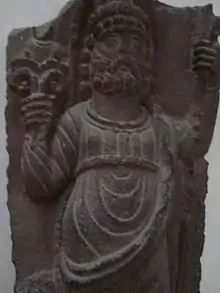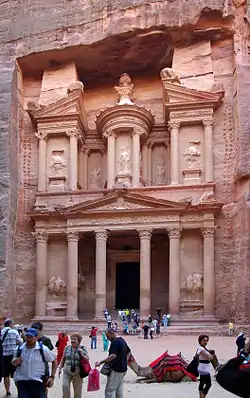Dushara
Dushara, also transliterated as Dusares, is a pre-Islamic Arabian god worshipped by the Nabataeans at Petra and Madain Saleh (of which city he was the patron).

Etymology
Dushara is known first from epigraphic Nabataean sources who invariably spell the name dwsrʾ, the Nabataean script denoting only consonants. He appears in Classical Greek sources Δουσάρης (Dousárēs) and in Latin as Dusares. The original meaning is disputed, but early Muslim historian Ibn al-Kalbi in his "Book of Idols" explains the name as Dhū l-Šarā (Arabic: ذو الشرى), meaning likely "The One from Shara", Shara being a mountain range south-east of the Dead Sea. If this interpretation is correct, Dushara would be more of a title than a proper name, but both the exact form of the name and its interpretation are disputed.[1][2]
Worship
| Part of the myth series on |
| Religions of the ancient Near East |
|---|
| Pre-Islamic Arabian deities |
| Arabian deities of foreign origin |
|
In Greek times, he was associated with Zeus because he was the chief of the Nabataean pantheon as well as with Dionysus.
A shrine to Dushara has been discovered in the harbour of ancient Puteoli in Italy. The city was an important nexus for trade to the Near East, and it is known to have had a Nabataean presence during the mid 1st century BCE.[3] The cult continued in some capacity well into the Roman period and possibly as late as the Islamic period.[4]
This deity was mentioned by the 9th century CE Muslim historian Hisham Ibn Al-Kalbi, who wrote in The Book of Idols (Kitab al-Asnām) that: "The Banū al-Hārith ibn-Yashkur ibn-Mubashshir of the ʻAzd had an idol called Dū Sharā."
See also
References
- F., Healey, John (10 May 2001). The religion of the Nabataeans : a conspectus. Leiden. pp. 85–97. ISBN 9789004301481. OCLC 944920100.
- Lewis, B. (1991). The Encyclopaedia of Islam. Vol. II: C–G (New ed.). Leiden: Brill. pp. 246–247. ISBN 9004070265. OCLC 399624.
- AA.VV. Museo archeologico dei Campi Flegrei - Catalogo generale (vol. 2) - Pozzuoli, Electa Napoli 2008, pag. 60-63
- Peterson, Stephanie Bowers, "The Cult of Dushara and the Roman Annexation of Nabataea" (2006). Open Access Dissertations and Theses. Paper 5352.
Bibliography
- Ibn al-Kalbī, The Book of Idols, Being a Translation from the Arabic of the Kitāb al-Asnām. Tr. and comm. Nabih Amin Faris (Princeton, Princeton University Press, 1952).
- Healey, John F., The Religion of the Nabataeans: A Conspectus (Leiden, Brill, 2001) (Religions in the Graeco-Roman World, 136).
- el-Khouri, Lamia; Johnson, David, "A New Nabataean Inscription from Wadi Mataha, Petra," Palestine Exploration Quarterly, 137,2 (2005), 169–174.
External links
| Wikimedia Commons has media related to Dushara. |
- Nabataean religion
- Kitab al-Asnam in the original Arabic (description on p. 5)
- Dhushara The Meaning of the Name
- "Solving the Enigma of Petra and the Nabataeans" Biblical Archaeology Review
